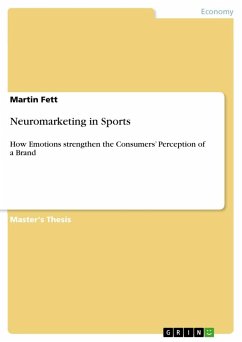Master's Thesis from the year 2011 in the subject Business economics - Offline Marketing and Online Marketing, grade: 1,0, University of Lugano, course: Sponsorship and Partnership Management - Corporate Communication, language: English, abstract: Until now, economic theory has not systematically integrated the impact of emotionson brand perception. Evidence from the evolving discipline of neuroscience suggeststhat decision-making is dependent on emotional processing. Interdisciplinary researchunder the label of "neuromarketing" arose. The key idea of this approach is to employrecent neuroscientific methods in order to analyze economically relevant brainprocesses. This thesis offers an overview of the current state of neuroeconomicresearch by defining the concept of neuromarketing, explaining methods that arewidely used and describing current studies in this new research area. The study whichwas conducted within this master thesis finally provides guidance for future research.Several studies found that there are no separated ways for cognition and emotion in ahuman being's brain. Emotions are deeply connected with cognitive processing andthus, even are a crucial part of human decision making.Since more and more companies want to enhance their brands, products, and serviceswith emotions, they are trying to use this important precondition and are engaging insports sponsorships, because sports as such is considered the biggest and mostemotional power in entertainment business.Several authors claim that in addition there has rarely been coherent research forsponsorship in general - and if at all, then only regarding the awareness of thesponsoring brands. Also, companies are not really aware if they seize the high potentialof their sponsorship activities. About 21% of companies that apply sponsorshipstrategies into practice do not even conduct a controlling phase. They are notmeasuring the achievement of their sponsorship objectives. Hence, they do not evenknow the success (or failure) of their strategies. Does sponsorship in sports havesignificant effects at all? Does it help to increase a brand's image?Only explicit measuring is very common in controlling the effects of sponsorshipactivities. The probands are being asked whether they remember one brand or anotherand how they rate it. Too often, however, the results are biased by many wrong preconditions, for example the Social Desirability Bias or that the sponsors only wantto hear what they want to hear.[...]








